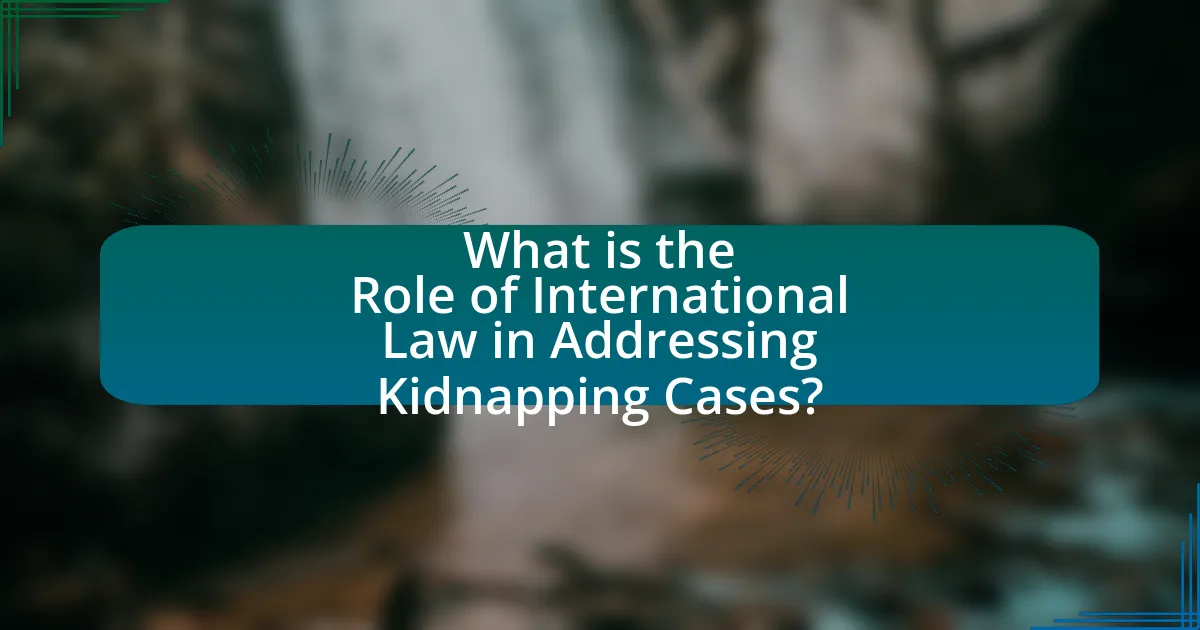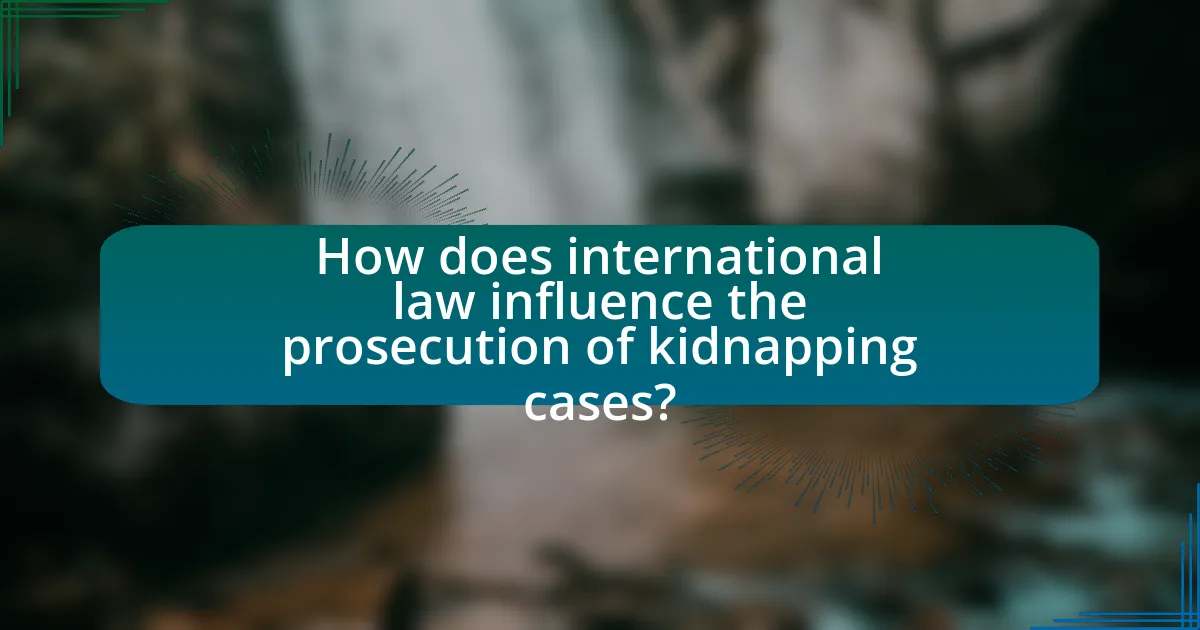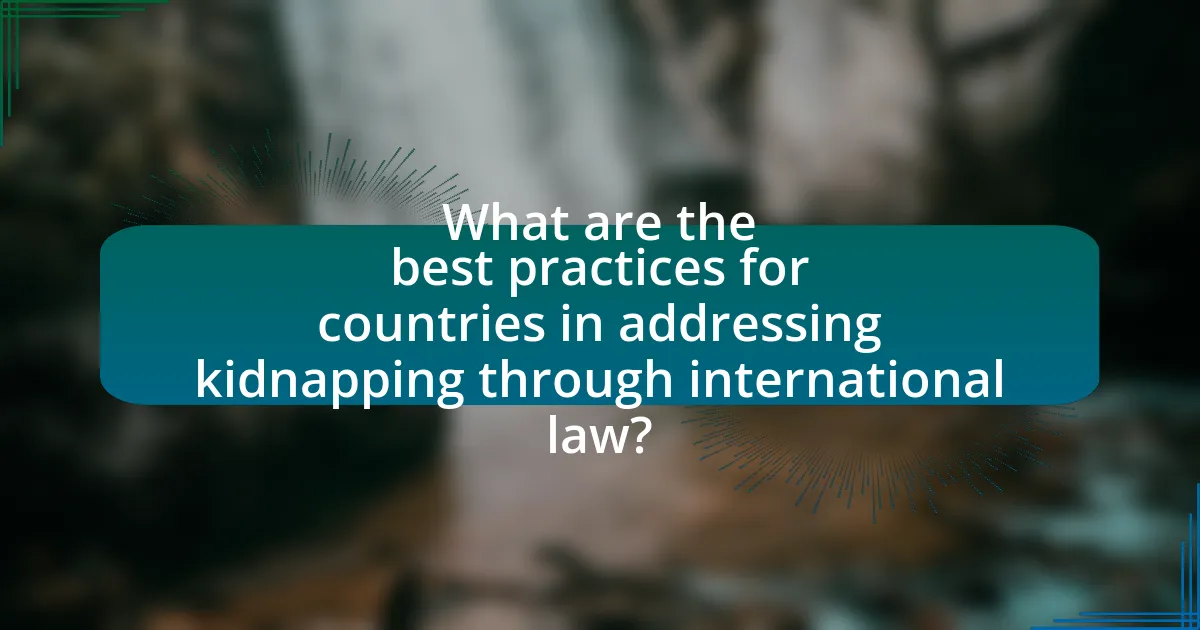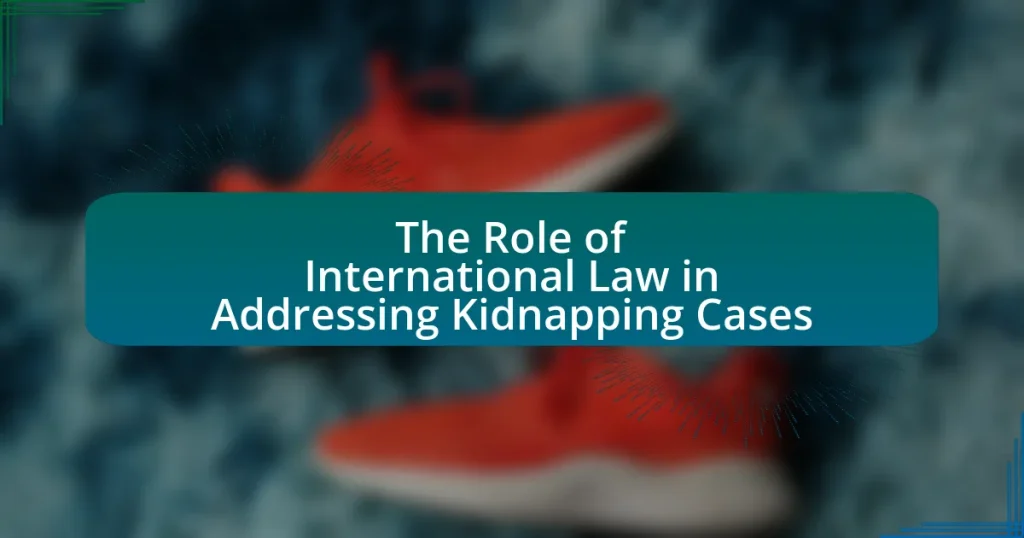The article examines the critical role of international law in addressing kidnapping cases, highlighting legal frameworks that facilitate cooperation among nations to combat this crime. It discusses the definitions of kidnapping under international law, key legal instruments such as the Hague Convention and the United Nations Convention against Transnational Organized Crime, and the varying definitions across jurisdictions. The article also addresses the importance of international law in victim protection, the challenges faced in enforcement, and the implications of political considerations on law enforcement efforts. Additionally, it outlines best practices for countries to enhance their legal frameworks and international collaboration in tackling kidnapping effectively.

What is the Role of International Law in Addressing Kidnapping Cases?
International law plays a crucial role in addressing kidnapping cases by establishing legal frameworks that facilitate cooperation among nations to combat this crime. Treaties such as the Hague Convention on the Civil Aspects of International Child Abduction provide mechanisms for the prompt return of abducted children across borders, while conventions like the United Nations Convention against Transnational Organized Crime enhance international collaboration in investigating and prosecuting kidnappers. Furthermore, international law encourages countries to adopt domestic laws that align with global standards, thereby strengthening the overall response to kidnapping incidents.
How does international law define kidnapping?
International law defines kidnapping as the unlawful seizure and carrying away of a person by force or fraud, often with the intent to hold that person for ransom or to achieve other objectives. This definition is supported by various international treaties and conventions, such as the United Nations Convention against Transnational Organized Crime, which emphasizes the criminal nature of such acts and the obligation of states to prevent and punish them. Additionally, the International Criminal Court recognizes kidnapping as a crime against humanity when it is part of a widespread or systematic attack against a civilian population.
What are the key legal instruments related to kidnapping in international law?
The key legal instruments related to kidnapping in international law include the Hague Convention on the Civil Aspects of International Child Abduction, the United Nations Convention against Transnational Organized Crime, and the International Convention for the Suppression of the Financing of Terrorism. The Hague Convention, adopted in 1980, aims to ensure the prompt return of children wrongfully removed from their habitual residence. The United Nations Convention against Transnational Organized Crime, adopted in 2000, addresses various forms of organized crime, including kidnapping for ransom. The International Convention for the Suppression of the Financing of Terrorism, adopted in 1999, criminalizes the financing of terrorist acts, which can include kidnapping. These instruments collectively provide a framework for international cooperation and legal standards in addressing kidnapping cases.
How do definitions of kidnapping vary across different jurisdictions?
Definitions of kidnapping vary significantly across different jurisdictions, primarily based on legal frameworks and cultural contexts. In the United States, for example, kidnapping is generally defined as the unlawful taking and carrying away of a person by force or fraud, with many states requiring the victim to be moved a substantial distance. In contrast, the United Kingdom defines kidnapping more broadly, encompassing the unlawful detention of a person without their consent, regardless of whether the victim is moved. Additionally, some jurisdictions may include specific elements such as the intent to hold for ransom or the use of threats, which can further differentiate the legal interpretations. These variations highlight the complexities in international law regarding kidnapping, as differing definitions can affect extradition processes and international cooperation in addressing such cases.
Why is international law important in combating kidnapping?
International law is crucial in combating kidnapping because it establishes a framework for cooperation among nations to prevent and prosecute such crimes. This framework includes treaties like the United Nations Convention against Transnational Organized Crime, which facilitates extradition and mutual legal assistance, thereby enabling countries to work together effectively. Additionally, international law sets standards for the protection of victims and the prosecution of offenders, ensuring that states take necessary actions against kidnapping. The existence of these legal instruments enhances accountability and deters potential kidnappers by signaling that such actions will not go unpunished across borders.
What are the implications of international law for victim protection?
International law significantly impacts victim protection by establishing legal frameworks that obligate states to prevent, investigate, and prosecute crimes against individuals, including kidnapping. These frameworks, such as the United Nations Convention against Transnational Organized Crime and its Protocols, mandate countries to implement measures that safeguard victims’ rights and ensure their access to justice. For instance, Article 25 of the Convention emphasizes the importance of protecting victims and witnesses, thereby reinforcing the obligation of states to create supportive environments for those affected by crimes. This legal obligation enhances accountability and promotes the development of national laws that prioritize victim assistance and protection, ultimately contributing to a more robust international response to kidnapping and related offenses.
How does international law facilitate cooperation among nations in kidnapping cases?
International law facilitates cooperation among nations in kidnapping cases through treaties, conventions, and legal frameworks that establish protocols for extradition, mutual legal assistance, and information sharing. For instance, the United Nations Convention against Transnational Organized Crime, which includes the Protocol against Trafficking in Persons, encourages countries to collaborate in preventing and combating kidnapping by harmonizing laws and procedures. Additionally, bilateral and multilateral agreements enable countries to expedite the extradition of suspects and provide legal assistance, thereby enhancing the effectiveness of international responses to kidnapping incidents. These legal instruments create a structured approach for nations to work together, ensuring that perpetrators are held accountable regardless of where the crime occurs.
What challenges does international law face in addressing kidnapping?
International law faces significant challenges in addressing kidnapping due to jurisdictional issues, lack of enforcement mechanisms, and varying definitions of kidnapping across countries. Jurisdictional challenges arise because kidnappings often involve multiple countries, complicating legal proceedings and extradition processes. Additionally, international treaties, such as the Hague Convention on the Civil Aspects of International Child Abduction, exist but lack robust enforcement, leading to inconsistent application. Furthermore, differing national laws and cultural perceptions of kidnapping hinder a unified international response, making it difficult to establish a coherent legal framework. These factors collectively impede effective international cooperation and resolution in kidnapping cases.
How do differing national laws complicate international responses to kidnapping?
Differing national laws complicate international responses to kidnapping by creating inconsistencies in legal definitions, enforcement mechanisms, and extradition processes. For instance, some countries may classify kidnapping differently, affecting how cases are prosecuted and the severity of penalties imposed. Additionally, variations in laws regarding consent, parental rights, and the treatment of hostages can hinder cooperation among nations. The United Nations Office on Drugs and Crime reported that these legal discrepancies can lead to jurisdictional conflicts, making it difficult to coordinate effective responses and rescue operations in cross-border kidnapping cases.
What role do political considerations play in international law enforcement against kidnapping?
Political considerations significantly influence international law enforcement against kidnapping by shaping the priorities and actions of states involved. Governments often weigh diplomatic relations, national security, and public opinion when responding to kidnapping cases, which can lead to varying levels of cooperation or resistance in international efforts. For instance, countries may prioritize the safe return of their citizens over legal obligations to extradite suspects, as seen in high-profile cases where political pressure resulted in leniency or non-cooperation. Additionally, political alliances can facilitate or hinder collaborative law enforcement efforts, impacting the effectiveness of international treaties and agreements aimed at combating kidnapping.

How does international law influence the prosecution of kidnapping cases?
International law significantly influences the prosecution of kidnapping cases by establishing legal frameworks and treaties that facilitate cooperation among nations. Instruments such as the United Nations Convention against Transnational Organized Crime and its Protocols provide guidelines for extradition, mutual legal assistance, and the definition of offenses related to kidnapping. These frameworks enable countries to collaborate in investigating and prosecuting kidnappers, ensuring that perpetrators cannot evade justice by crossing borders. For instance, the 1980 Hague Convention on the Civil Aspects of International Child Abduction aims to protect children from international abduction by a parent or guardian, mandating the prompt return of abducted children to their habitual residence. This legal structure underscores the importance of international cooperation in effectively addressing and prosecuting kidnapping cases across jurisdictions.
What are the legal frameworks for prosecuting kidnappers internationally?
The legal frameworks for prosecuting kidnappers internationally include various treaties, conventions, and national laws that facilitate cooperation among states. The United Nations Convention against Transnational Organized Crime, particularly its Protocol against Trafficking in Persons, provides a basis for international collaboration in addressing kidnapping. Additionally, the Hague Convention on the Civil Aspects of International Child Abduction establishes procedures for the return of abducted children, reinforcing legal mechanisms for prosecution. Countries often implement these international agreements through their domestic laws, which may include specific statutes addressing kidnapping and related offenses. These frameworks enable jurisdictions to work together, share evidence, and extradite offenders, thereby enhancing the effectiveness of international legal responses to kidnapping.
How do extradition treaties impact the prosecution of kidnapping cases?
Extradition treaties significantly enhance the prosecution of kidnapping cases by facilitating the transfer of suspects between countries. These treaties establish legal frameworks that allow nations to request the extradition of individuals accused of kidnapping, ensuring that offenders cannot evade justice by fleeing to another jurisdiction. For instance, the United States has extradition treaties with over 100 countries, which enables law enforcement to pursue and prosecute kidnappers who cross international borders. This cooperation is crucial, as kidnapping often involves multiple jurisdictions, and the ability to extradite suspects increases the likelihood of successful prosecution and serves as a deterrent against such crimes.
What role do international courts play in kidnapping prosecutions?
International courts play a crucial role in kidnapping prosecutions by providing a legal framework for the prosecution of individuals accused of kidnapping across borders. These courts, such as the International Criminal Court (ICC), can prosecute cases involving kidnapping that meet specific criteria, including those that constitute crimes against humanity or war crimes. For instance, the ICC has jurisdiction over cases where kidnappings are part of a widespread or systematic attack against a civilian population, as outlined in the Rome Statute. This legal authority enables international courts to hold perpetrators accountable, promote justice, and deter future kidnappings by establishing a precedent for international law enforcement cooperation.
How do international conventions support victims of kidnapping?
International conventions support victims of kidnapping by establishing legal frameworks that promote cooperation among nations to prevent and respond to such crimes. For instance, the United Nations Convention against Transnational Organized Crime, adopted in 2000, includes protocols specifically addressing human trafficking and related offenses, which encompass kidnapping. These conventions facilitate information sharing, joint investigations, and the extradition of offenders, thereby enhancing the ability of countries to protect victims and bring perpetrators to justice. Additionally, the conventions often encourage member states to implement national laws that provide support services for victims, including legal assistance and psychological support, thereby directly addressing the needs of those affected by kidnapping.
What specific rights do victims have under international law?
Victims have specific rights under international law, including the right to access justice, the right to protection, and the right to restitution. These rights are enshrined in various international instruments, such as the United Nations Declaration of Basic Principles of Justice for Victims of Crime and Abuse of Power, which emphasizes that victims should be treated with compassion and respect for their dignity. Additionally, international human rights treaties, like the International Covenant on Civil and Political Rights, affirm the right to an effective remedy for violations, ensuring that victims can seek redress and hold perpetrators accountable.
How can victims seek justice through international legal mechanisms?
Victims can seek justice through international legal mechanisms by utilizing treaties, conventions, and international courts that address human rights violations and crimes such as kidnapping. For instance, the United Nations Convention against Transnational Organized Crime and its Protocols provide a framework for cooperation among states to combat organized crime, including kidnapping. Additionally, victims can bring cases before the International Criminal Court if the crime falls under its jurisdiction, as established by the Rome Statute, which includes serious offenses like abduction. These mechanisms enable victims to hold perpetrators accountable and seek reparations, reinforcing the international community’s commitment to justice and human rights.

What are the best practices for countries in addressing kidnapping through international law?
Countries should adopt comprehensive legal frameworks that align with international conventions to effectively address kidnapping through international law. Implementing the United Nations Convention against Transnational Organized Crime and its Protocols, particularly the Protocol against the Smuggling of Migrants by Land, Sea and Air, provides a structured approach for nations to combat kidnapping. Additionally, countries should enhance cooperation through mutual legal assistance treaties, which facilitate the sharing of evidence and extradition processes.
Establishing specialized law enforcement units trained in international law and human rights can improve response capabilities. For instance, the International Criminal Police Organization (INTERPOL) offers resources and support for cross-border investigations. Furthermore, countries should engage in regular training and capacity-building initiatives to ensure law enforcement personnel are equipped to handle kidnapping cases effectively.
Data from the Global Report on Trafficking in Persons indicates that international collaboration significantly reduces the incidence of kidnapping, highlighting the importance of shared intelligence and joint operations. By adhering to these best practices, countries can create a more robust legal and operational framework to combat kidnapping on a global scale.
How can nations improve their legal frameworks to combat kidnapping?
Nations can improve their legal frameworks to combat kidnapping by enacting comprehensive anti-kidnapping laws that include stringent penalties, victim protection measures, and international cooperation protocols. Comprehensive laws should define kidnapping clearly, establish severe penalties to deter offenders, and include provisions for the protection and support of victims, as seen in countries like Mexico, which has implemented specific laws targeting kidnapping with penalties of up to 50 years in prison. Additionally, nations should enhance international cooperation by ratifying treaties such as the United Nations Convention against Transnational Organized Crime, which facilitates cross-border collaboration in investigating and prosecuting kidnapping cases. This approach not only strengthens domestic laws but also aligns with international standards, thereby improving overall effectiveness in combating kidnapping.
What role does training law enforcement play in effective kidnapping prevention?
Training law enforcement is crucial for effective kidnapping prevention as it equips officers with the skills and knowledge necessary to identify, respond to, and investigate kidnapping cases. Proper training enhances situational awareness, enabling law enforcement to recognize potential threats and implement preventive measures. For instance, specialized training programs often include techniques for interviewing victims and witnesses, understanding the psychological aspects of kidnappers, and employing technology for tracking and recovery efforts. Research indicates that jurisdictions with well-trained law enforcement agencies experience lower rates of kidnapping incidents, as officers are better prepared to act swiftly and effectively in crisis situations.
How can countries enhance international collaboration to tackle kidnapping?
Countries can enhance international collaboration to tackle kidnapping by establishing bilateral and multilateral agreements focused on information sharing, joint investigations, and legal frameworks. These agreements facilitate the exchange of intelligence regarding kidnapping networks and trends, which is crucial for preemptive action. For instance, the United Nations Convention against Transnational Organized Crime encourages member states to cooperate in combating organized crime, including kidnapping. Additionally, countries can participate in joint training programs for law enforcement agencies to standardize procedures and improve response times. Collaborative efforts, such as the INTERPOL database on missing persons and abducted children, further strengthen international cooperation by providing real-time data access.
What resources are available for countries dealing with kidnapping cases?
Countries dealing with kidnapping cases have access to various resources, including international treaties, law enforcement cooperation, and support from non-governmental organizations. International treaties such as the Hague Convention on the Civil Aspects of International Child Abduction provide legal frameworks for addressing cross-border kidnapping. Law enforcement agencies can collaborate through organizations like INTERPOL, which facilitates information sharing and operational support. Additionally, NGOs such as the International Committee of the Red Cross offer assistance in crisis situations, providing expertise in negotiation and victim support. These resources collectively enhance a country’s ability to effectively respond to and manage kidnapping incidents.
What organizations provide support and guidance on international kidnapping laws?
Organizations that provide support and guidance on international kidnapping laws include the International Criminal Police Organization (Interpol), the United Nations Office on Drugs and Crime (UNODC), and the International Association of Chiefs of Police (IACP). Interpol facilitates international police cooperation and provides resources for law enforcement agencies dealing with kidnapping cases. The UNODC offers legal frameworks and technical assistance to countries in combating transnational crime, including kidnapping. The IACP develops best practices and guidelines for law enforcement agencies to effectively respond to kidnapping incidents. These organizations play a crucial role in enhancing international collaboration and legal standards related to kidnapping.
How can countries access legal assistance for kidnapping cases?
Countries can access legal assistance for kidnapping cases through international treaties, bilateral agreements, and cooperation with organizations such as INTERPOL. These frameworks facilitate the sharing of information, resources, and legal expertise among nations. For instance, the Hague Convention on the Civil Aspects of International Child Abduction provides a legal mechanism for countries to work together in resolving international child abduction cases, ensuring prompt return of abducted children. Additionally, countries can request assistance from their embassies or consulates, which can provide legal resources and connect them with local legal experts.
What practical steps can be taken to strengthen international law against kidnapping?
To strengthen international law against kidnapping, countries should adopt and implement comprehensive legal frameworks that criminalize kidnapping, enhance cooperation among law enforcement agencies, and establish international treaties focused on extradition and mutual legal assistance. Comprehensive legal frameworks ensure that all forms of kidnapping are clearly defined and penalized, which is supported by the United Nations Convention against Transnational Organized Crime, which encourages member states to adopt laws against kidnapping. Enhanced cooperation among law enforcement agencies can be achieved through joint training programs and information-sharing platforms, as evidenced by successful initiatives like INTERPOL’s database on missing persons and abducted children. Establishing international treaties for extradition and mutual legal assistance facilitates the prosecution of offenders across borders, as seen in the European Convention on Extradition, which streamlines the process for countries to extradite individuals charged with kidnapping.


